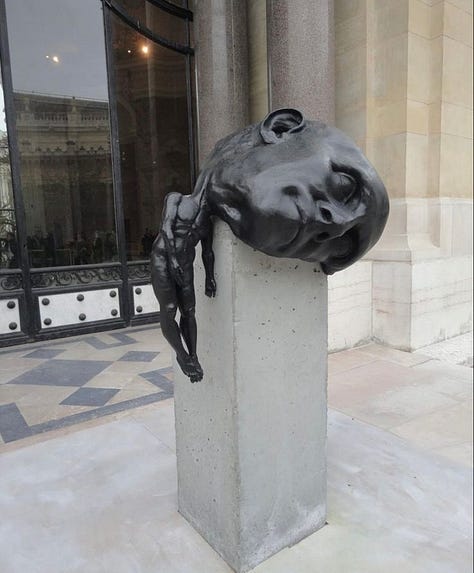This piece in 3 sentences: Passively consuming information leads us to hold thoughtless beliefs, sacrificing proper understanding. The mainstream claim is that we have a misinformation problem; I propose we have a thinking problem. Our society is so drunk on information that we cannot collectively organize and process the information thrown at us (the act of thinking).
"Dare to know! (Sapere aude.) Have the courage to use your own understanding." - Immanuel Kant



For the past 3 years, I’ve been in a recurring conversation about misinformation. The topic seemingly gets brought up at every dinner conversation. Even the World Economic Forum named it the world's most significant non-climate risk for 2025.
The images above, a collection of sculptures from Thomas Leeroy, enter my mind anytime I am engaged on the topic. They capture my sentiment that we are so drunk on information that we cannot think through the information we consume.
Hear me out:
Information has never been so available and accessible to us.
The ability to validate or refute information presented to us is easier now than ever.
The above points are not opinions. They are a fact. If this is the reality we operate in, how is it that we believe we are so misinformed (or more commonly, how is my intellectual enemy so wrong all the time)? I think the conversation goes 2 ways:
The world is all of a sudden filled with misinformation, and we have to find ways to suppress it, restrict it, and punish it.
We have developed poor information hygiene, passively consuming information to a point that we cannot organize serious thoughts.
And if I could triple underline and make “passively consuming information” jump off of your screen, I would.
Passive consumption will rot your mind.
Charlie Munger is a famous promoter of the mental model called “inversion”. Inversion is where you approach a problem by considering the opposite of what you want to achieve, identifying ways to avoid failure or undesirable outcomes.
So, what shouldn’t I do if I want to be an original and serious thinker? Some reasonable things to avoid:
I shouldn’t avoid investigating opinions and claims on topics that matter to me
I shouldn’t base my opinions solely on algorithmically curated sources
I shouldn’t accept a cited fact without first reviewing the source myself
"I never allow myself to hold an opinion on anything that I don’t know the other side’s argument better than they do."- Charlie Munger
Whether you are getting your information from TikTok, a podcast, or a broadcast news channel, you are almost certainly violating all of the “should nots” established above. The mediums called out here are appropriate for entertainment purposes, not information-gathering and perspective-building purposes.
And I am sure we all relate to this. How many times have you shared an opinion on something based on a podcast you listened to and crumbled when someone questioned the details of what you shared?
It’s because you are blurring the line between information and entertainment. You don’t have a high-resolution understanding of the topic, you were simply fed entertainment on a topic.
Understanding matters.
Understanding critical aspects of society is vital because it enables us to question the structures, values, and norms that shape our existence. Without true understanding, you risk being a puppet of emotional and irrational causes. A reckless critic of the past, present, and future.
But one must have the will to think. Thinking requires you to reject answers that you don’t understand. Thinking requires you to overcome intellectual laziness, a habit we all have to accept satisfactory answers that often align with our prior knowledge and biases.
Understanding something takes tremendous energy. And as
outlined in his post How to Understand Things (2020), people who understand things know that:Figuring out if you understand something takes effort and the willingness to challenge your understanding from multiple angles.
Taking a serious approach to thinking and understanding is as much about virtue (integrity, humility, etc.) as it is about raw intelligence.
“Intelligent people simply aren’t willing to accept answers that they don’t understand...”
Passively consuming information on a barrage of topics doesn’t particularly align well with what Nabeel outlines above. On the contrary, it takes away from the attention and energy you need to truly understand things.
Active thinking requires intentional habits.
The good news is that we can learn from serious thinkers to understand how to practice good information hygiene.
First, some mindset principles we must have an affinity for:
Energy, focus, and attention are finite resources
Intentionality is your best friend. Intention allows you to bring the right attitude to learning and understanding
Reason upwards. Get information and data yourself and draw your conclusions. Compare them to others second
I particularly enjoy Cal Newport’s ideas on information consumption. He is at the top of his field in productivity and deep work and is a very worthwhile follow.
Ignore the daily news and instead opt for news round-ups. Part of this is to move away from algorithmic curated news to avoid the traps of inherently limited and silo’d information.
Schedule your information intake. Protect your cognitive limits by structuring your day, including when you take in information. Constrain it with intentional boundaries rather than always having news and feeds on in the background.
Focus on primary sources. Get as close to first-hand information as you can, this allows you to ground your understanding and perspective. You can build up that perspective by reading journalist pieces and expert columns, but building the initial base allows you to test their perspectives.
Protect your energy, use it wisely and see you on the next one.
Zishan


